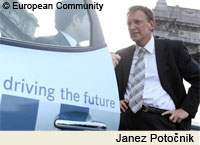Potocnik outlines role for hydrogen energy in European research
EU Commissioner for Science and Research, Janez Potocnik, addressed the opening of the 16th World Hydrogen Energy Summit, held in Lyon, France, where he outlined the key role for hydrogen energy in European research. Commissioner Potocnik pointed out that the EU remains a voracious consumer of fossil fuels - burning around 15 per cent of the world's total use each year, spewing millions of tonnes of carbon dioxide, the most common greenhouse gas, into the atmosphere. 'Climate change is considered by many to be one of the biggest challenges ever faced by mankind. Do we want to stand condemned by future generations? Can we afford to miss the opportunity to fix their world? I do not think so,' he said. The Commissioner said that a shift away from fossil fuels provides an enormous challenge, but also an enormous opportunity. 'Cleaning up our conventional fossil based energy systems and introducing new ones will be complex, inconvenient, and expensive. But it is also a golden opportunity to create wealth, improve our health, our environment and stabilise our troubled world,' he said. New technologies will translate into new products or services. There is a clear move towards cleaner forms of energy, and hydrogen is so attractive because it is genuinely clean, with its only waste product water. If Europe leads the world in hydrogen power, then it will develop lead markets for the new technology, which will benefit the whole economy. Three areas which are essential for a working hydrogen infrastructure are: inexpensive methods of generating hydrogen, whether that could be through the 'cracking' of fossil fuels or water; safe methods of storing and transporting hydrogen, which is highly inflammable - the infamous Hindenburg zeppelin disaster was due to the hydrogen used to keep the craft afloat igniting; and finally new forms of engines to make the most efficient use of the hydrogen. Mr Potocnik outlined a vital role for the Seventh Framework Programme (FP7) in this research, and in particular the work pioneered by the European Hydrogen and Fuel Cell Technology Platform. 'We shall shortly receive the Platform's proposal for an Implementation Plan. This will be a key document. It will set out targets and priorities for integrated research and demonstration actions needed to take the hydrogen and fuel cells to market readiness in five to ten years,' he said. The Platform's proposal will also prioritise research under both FP7 and other public-private partnerships. Mr Potocnik pointed out that the Commission already supports the International Partnership for the Hydrogen Economy, and is so committed to seeing advancements in hydrogen technology. 'In short, hydrogen ticks all the right boxes in terms of the global policy benefits it can bring,' he said. 'It may, or may not be the 'Holy Grail' for energy, but I am convinced that it will play a major role in our future energy systems. 'Hydrogen may be the simplest and lightest element in the Periodic Table. Paradoxically, harnessing it for everyday consumption is surely one of the toughest technical and political challenges we have faced for a long time,' said the Commissioner in his summing-up. The World Hydrogen Energy Summit will run until June 16.
Countries
France



